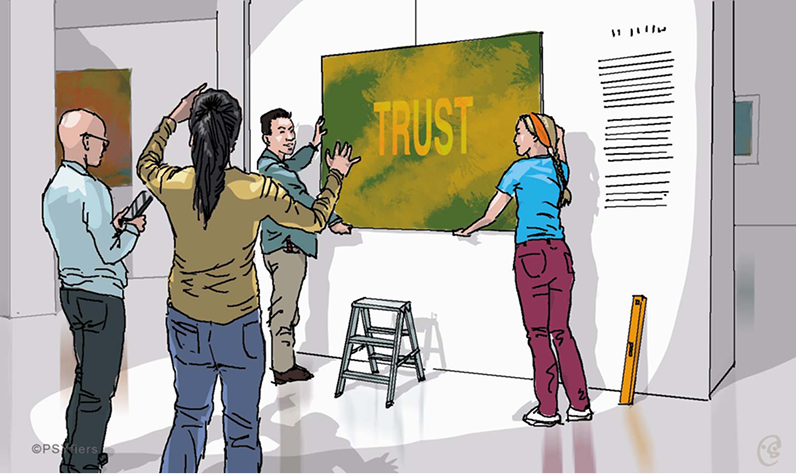
The world is facing a trust crisis. Political divisions, economic uncertainty, and increasing digitalization are all contributing to the erosion of interpersonal trust—both in personal and professional settings. Yet, trust is the foundation of effective teams, productive collaboration, and long-term success. Building and maintaining trust has therefore become one of the most crucial tasks for companies and organizations.
Trust is not just a pleasant byproduct of good relationships—it is a powerful driver of peak performance. While fear can also generate short-term results, it does so through pressure and insecurity—a toxic foundation for sustainable success. Trust, on the other hand, fosters a culture of openness, innovation, courage, and commitment.
In today’s highly digitalized work environment, where remote work and virtual communication dominate, personal interaction is often reduced. Distance grows, misunderstandings increase, and the sense of connection fades. This is precisely where leaders and teams must take action to deliberately cultivate trust.
Based on my experience with turnaround processes and insights from psychology and neurobiology, we have developed a proven five-step approach to systematically build trust:
Create proximity – Trust doesn’t thrive in isolation. Face-to-face interactions, shared experiences, and informal conversations strengthen relationships. Even in virtual teams, it is crucial to create spaces for personal exchange, whether through regular meetings or dedicated discussions that go beyond purely professional topics.
Listen instead of judging – People who feel heard are more likely to open up. But true listening is more than just remaining silent while someone speaks—it means showing genuine interest, asking questions, and embracing different perspectives without jumping to conclusions.
Embrace diversity as a strength – Different viewpoints and work styles are not obstacles but assets. Diversity fuels creativity, strengthens problem-solving skills, and prevents groupthink. To build trust, we must not only accept but actively appreciate different ways of thinking and working.
Lead by example – Trust is not built through words but through consistent actions. Leaders and team members must model the behaviour they expect from others—whether it’s transparency, reliability, or fostering a culture where mistakes are seen as learning opportunities.
Foster shared goals and connection – Trust grows when people feel they are working towards a common goal. Clear, inspiring visions unite teams and provide direction. It is particularly effective to set not just performance goals, but also behavioural goals—values and principles that shape team dynamics.
People want to trust—it’s in our nature. They just need the right environment to do so. Often, a strong impulse is all it takes to set the trust-building process in motion. But trust is not a given—it is a conscious decision that must be made every day.
The reward? A work environment where people unleash their full potential and achieve extraordinary things together.
The Mission Team program is specifically designed for this purpose: it provides the impetus and structure teams need to take the first step toward a culture of trust and collaboration.
Curious about Mission Team and have a few questions?
Excited to dive deeper into what we offer?
Ready to transform your team with an incredible workshop?
We help people work better together 🏆

© 2025 Mission Team, Inc. All rights reserved.